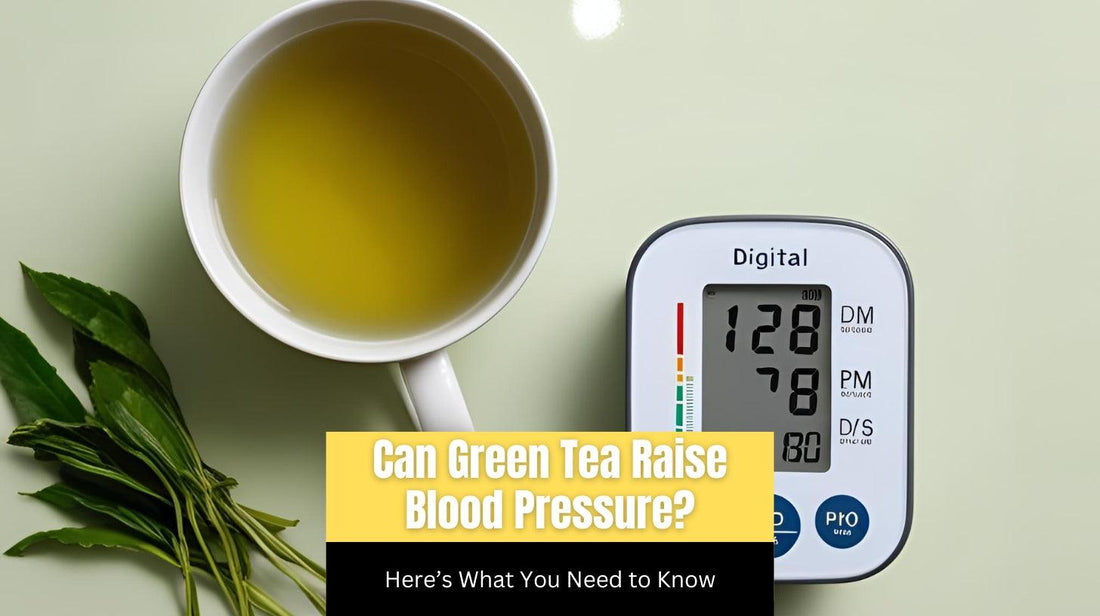
Can Green Tea Raise Blood Pressure? Here’s What You Need to Know
Heart-Healthy Tea Alternatives
Green tea is a beloved daily habit for millions—praised for weight management, clearer skin, mental alertness, and anti-aging properties. But there’s still one question that worries many health-conscious drinkers:
"Can green tea raise blood pressure?"
If you're navigating hypertension, caffeine sensitivity, or are just trying to keep your heart happy, this blog breaks down everything you need to know. From the latest research to herbal alternatives, here's your updated 2025 guide to green tea and blood pressure.
Understanding Blood Pressure & Why It Matters
Blood pressure measures how much force your blood puts on artery walls as it moves through your body. Two numbers matter:
- Systolic (top number): Pressure during a heartbeat
- Diastolic (bottom number): Pressure between beats
Healthy blood pressure: Around 120/80 mmHg
Hypertension: Above 130/80 mmHg
High blood pressure increases the risk of heart attacks, strokes, kidney disease, and other chronic illnesses. That's why even your daily tea choice could matter more than you think.
So, Can Green Tea Raise Blood Pressure?
Short Answer: No – and It Might Even Lower It
Research consistently shows that green tea does NOT raise blood pressure for most people. In fact, its compounds may help lower both systolic and diastolic blood pressure over time.
But context matters. If you're very sensitive to caffeine or drink green tea in large quantities, you might notice a temporary spike.
Let’s Break It Down: What’s in Green Tea That Affects Blood Pressure?
1. Caffeine: Mild but Not Harmless for Everyone
- Content: ~25-45 mg per 8 oz cup
- Compare that to: 90-200 mg in coffee
Caffeine can temporarily raise blood pressure, especially in caffeine-sensitive individuals. But the caffeine in green tea is far lower and released more slowly due to the presence of L-theanine (an amino acid that promotes relaxation).
Tip: Switch to decaf green tea or consume your cup earlier in the day to avoid sleep disruption.
2. Catechins (EGCG): The Real MVP
- Catechins are powerful antioxidants, especially epigallocatechin gallate (EGCG)
- Proven to improve blood vessel elasticity and reduce arterial inflammation
Multiple studies have found that drinking 3–4 cups per day can lead to small but meaningful reductions in blood pressure over time.
3. L-Theanine: The Zen Compound
Green tea contains L-theanine, which promotes mental calmness. This counteracts the jittery effects of caffeine and helps manage stress—an often-overlooked factor in high blood pressure.
What the Research Says
Let’s back this up with some science:
- 2023 Meta-Analysis (Nutrients Journal): Green tea significantly reduced systolic and diastolic blood pressure in participants with prehypertension.
- Harvard Health Review: Long-term green tea drinkers had 18% lower risk of heart disease.
- Asian Pacific Journal of Clinical Nutrition: Even decaffeinated green tea showed positive cardiovascular effects.
Green tea isn't a miracle cure—but it's definitely not a risk for most people.
Who Should Be Cautious With Green Tea?
While green tea is generally safe, watch out if you fall under these categories:
- Caffeine-sensitive individuals: May feel palpitations or jitters
- People on beta-blockers or blood pressure meds: Green tea can slightly interfere
- Pregnant or breastfeeding individuals: Monitor intake carefully
Solution: Consider caffeine-free herbal alternatives for daily sipping.
Herbal Alternatives: Teas That May Lower Blood Pressure
If you’re reducing caffeine or want to support heart health further, here are three proven herbal teas available at DanfeTea.com:
🌺 Hibiscus Bliss Herbal Tea
- Packed with anthocyanins and vitamin C
- Proven in clinical trials to lower blood pressure
- Refreshing and naturally tart
🌼 Chamomile Calm Herbal Tea
- Helps reduce stress and cortisol levels
- Promotes restful sleep, lowers anxiety
- Caffeine-free and great before bed
🌿 Moringa Superleaf Herbal Tea
- Contains calcium, potassium, and iron
- Acts as a natural vasodilator, helping blood flow more easily
- Anti-inflammatory and immune-boosting
Tips to Keep Your Blood Pressure in Check
- Drink 2–4 cups of tea daily
- Manage stress through mindfulness or yoga
- Cut sodium, sugar, and processed foods
- Get 7–8 hours of sleep
- Exercise at least 30 minutes daily
Your Next Sip: Calm, Caffeine-Free, and Delicious
Looking for teas to support a relaxed, healthy lifestyle? Try these herbal favorites from DanfeTea.com:
- Hibiscus Bliss Herbal Tea
- Chamomile Calm Herbal Tea
- Turmeric Ginger Herbal Tea
Green Tea Is Heart-Friendly (In Moderation)
Green tea does not raise blood pressure in most people. Instead, its antioxidants, L-theanine, and mild caffeine may actually improve cardiovascular health over time. But if you're caffeine-sensitive or on certain medications, consider caffeine-free herbal options like hibiscus, chamomile, and moringa.
Your next cup could support a calmer, healthier heart.
FAQs: Your Green Tea Questions, Answered
Q1: Is green tea safe for people with high blood pressure?
Yes, for most people. Green tea may help reduce blood pressure when consumed regularly and moderately.
Q2: Can decaffeinated green tea help with blood pressure?
Yes. Even without caffeine, decaf green tea still contains beneficial catechins like EGCG.
Q3: How much green tea is too much?
Stick to 3–4 cups a day. Overconsumption might affect sleep or cause mild caffeine side effects.
Q4: Does green tea interfere with blood pressure medications?
Possibly. It may reduce absorption of certain beta-blockers. Always consult your doctor.
Q5: Is matcha worse than green tea for blood pressure?
Matcha contains more caffeine per serving, so it might raise blood pressure temporarily in sensitive individuals.










